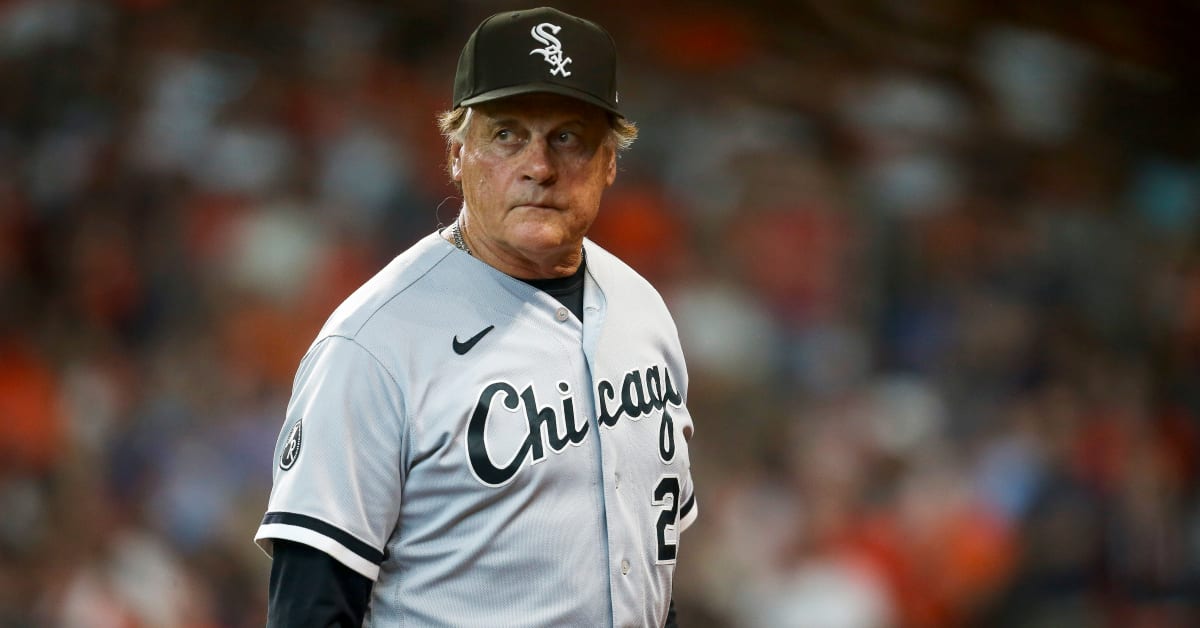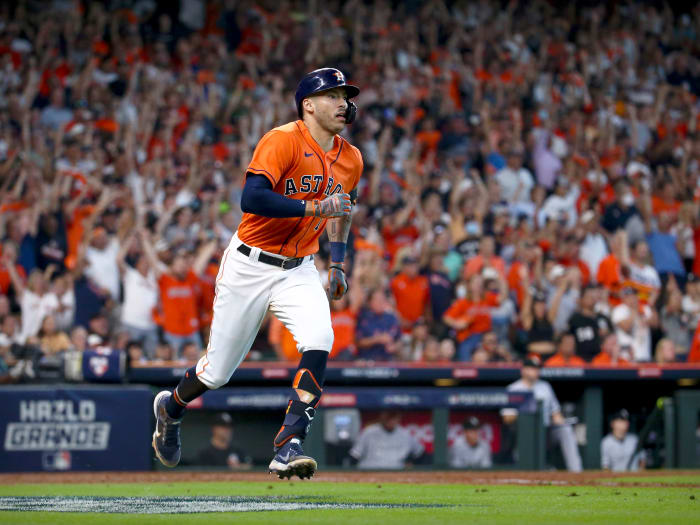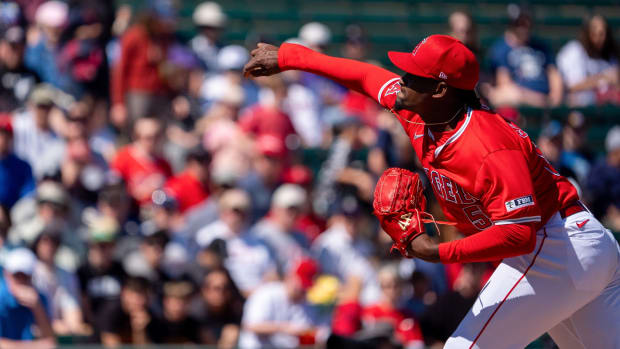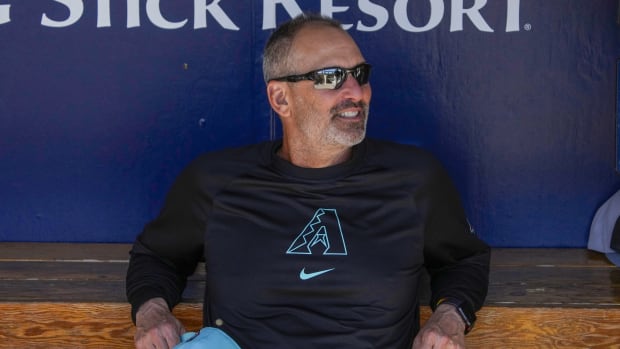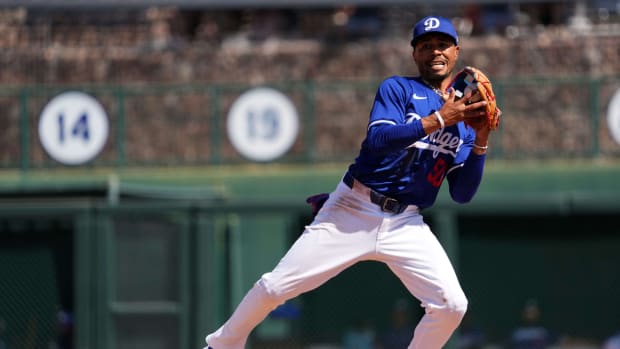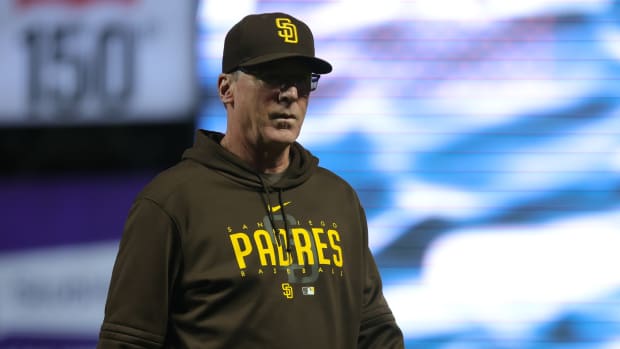Should We Blame La Russa for White Sox’ Struggles?
No matter what happens in the two games today, three of the four Division Series will see Game 4. The Red Sox’ bats erupted against the Rays’ deep pitching staff to even the series Friday night. Last night, the Braves won Pitchers Duel Part II with the Brewers, shutting out Milwaukee, 3–0, behind Max Fried’s six innings and nine Ks. The final game of the night, between the Dodgers and Giants, started out close enough before Cody Bellinger and A.J. Pollock ripped things open in the sixth with back-to-back two run doubles.
And then there are the White Sox, who’ve looked completely overmatched so far in their two losses to the Astros. It’s true Chicago had 11 hits (one more than Houston) in Friday’s 9–4 loss in Game 2, but all of them were singles and only two of them came in 11 at bats with runners in scoring position.
Much has been made about the White Sox’ coasting to the playoffs in baseball’s worst division, as well as their losing regular-season record against teams above .500. There were reasonable questions about whether this team could actually win in October, when they’d suddenly be playing games of the highest stakes against the best American League opponents. But really, this isn’t about the lowly AL Central, nor is it about the other teams in the AL playoff field. No, Chicago’s woes come down to its its 77-year-old, Hall-of-Fame manager who all season has seemed at least one step behind his counterpart in the other dugout.
Tony La Russa’s hiring as White Sox skipper nearly one year ago was rightly viewed with skepticism. Much of the doubting focused on clubhouse culture, which pitted La Russa against Tim Anderson, the White Sox’ Black shortstop who has criticized the league’s white hierarchy and institutional racism. If any uniformed member in today’s game represents this white hierarchy, it's La Russa—a white guy from Tampa born at the end of the Silent Generation who made his MLB-player debut with the Kansas City A’s in 1963. That doesn't mean he's a bad guy, but that he's probably the wrong guy to lead any major-league team in 2021. Those who questioned the hiring on these grounds received validation early on, when La Russa condemned Yemín Mercedes for swinging at a 3–0 pitch and crushing a glorious grand slam off Twins first baseman Willians Astudillo, who was pitching in the ninth inning of what was then a 15–4 Chicago lead. After Minnesota tried to retaliate and threw a pitch behind Mercedes in the seventh inning of the following game, La Russa said he didn’t have a problem with what the Twins did.
As the entirely avoidable fiasco carried on for days and La Russa doubled down on his handling of the situation, it was Anderson who helped diffuse things. “Tony's like that dad, we're like his kids. We're like the bad kids who don't listen. But we all get along,” Anderson told reporters. “Regardless of what Tony said to the media, he's still our manager. We're getting along just fine. He's going to put us in the best position to win.”
Anderson, who doesn’t shy away from speaking his mind, probably wouldn’t have said that La Russa and the players were getting along if it wasn’t true. Rather, this quote is so interesting because of the last sentence: “He's going to put us in the best position to win.” Because everything that we’ve seen this year from La Russa in the dugout has indicated that he is not putting the White Sox in the best position to win. This is what’s put the White Sox on the brink of elimination despite their dynamic lineup and great pitching staff.
La Russa first retired from managing in 2011, after he led the Cardinals to their 11th World Series title. Baseball has changed a lot since then. Teams use more pitchers per game, and starters pitch fewer innings per game. The league batting average this year is the lowest single-season mark since 1973, the year the DH was instituted and the final year of La Russa’s playing career. The amount of plate appearances that result in either a home run, walk or strikeout (the three true outcomes) also has increased by 20%.
| Pitchers/game | IP/GS | Lg. Avg. | Lg. TTO% | |
|---|---|---|---|---|
2011 | 3.86 | 6.03 | .255 | 29% |
2021 | 4.34 | 5.02 | .243 | 35% |
The rules of the game have also changed. La Russa has been credited with inventing or at least popularizing the roles of both the modern, one-inning closer and the lefty specialist. Today, there are still plenty of primary closers, though many teams now use different pitchers in save situations and turn to their best reliever in various late-inning, high-leverage moments. The one-batter-only lefty specialist is no longer allowed under the three-batter minimum rule implemented after the 2019 season. In a decade, the game has passed him by.
In his first two postseason games back in the dugout, La Russa has made some puzzling decisions. He turned to Lance Lynn as Chicago’s Game 1 starter. Lynn is a great pitcher, one of the game’s best and most underrated, but he’s an awful matchup against this Astros lineup, which feasts on heaters. This season, 92.3% of Lynn’s pitches were some type of fastball (four-seamer, cutter or sinker). No wonder he allowed five runs on six hits across 3 2/3 innings. He’s lost his last six starts against Houston.
Turning to an ace despite the unfavorable matchup is somewhat forgivable. What’s inexcusable is how La Russa managed his bullpen in Game 2. The game was tied 4–4 in the seventh when La Russa called on lefty sinkerballer Aaron Bummer to face the top of the Astros order. Four batters later, the Astros had a 5–4 lead and had runners on the corners with one out. La Russa turned to Craig Kimbrel to get the White Sox out of the jam, despite Kimbrel’s struggles (5.09 ERA) in 24 games since coming over from the Cubs at the trade deadline. Meanwhile, the White Sox had righthander Michael Kopech (1.76 ERA in 15 1/3 innings over the past month) available in the ‘pen. It’s true Kopech’s primary pitch is his 97-mph four-seam fastball, but he also has a nasty slider that opponents were hitting just .193 against this season. La Russa’s explanation after the game for not using Kopech was even more confounding: “If we had needed him to win the game today we would have pitched him.”
Instead, Kimbrel allowed a two-run double to Carlos Correa and then a two-run homer to Kyle Tucker. It was after the Astros had a five-run lead that La Russa suddenly seemed to realize the importance of the game. He put in White Sox closer Liam Hendriks to pitch the eighth—in a five-run game.
There are plenty of non-TLR reasons to explain what’s likely to be a Chicago first-round exit: Houston’s playoff experience and undeniable talent, the White Sox’ power disappearance (zero extra-base hits in Games 1 and 2), etc. But La Russa’s postseason mistakes, along with all the uncertainty that clouded his initial hiring and self-inflicted problems throughout the year, will make him the easiest person to blame. Whether that leads to his firing or not is unclear because of his friendship with owner Jerry Reinsdorf, the very person who hired him despite all the concerns in the first place.
Still, this series helped us figure out the answer to question I posed Thursday in this newsletter: Did the White Sox make the playoffs because of or in spite of TLR? That answer is crystal clear. It’s unambiguously the latter.
1. THE OPENER
“On Friday night, Dodgers manager Dave Roberts issued his hitters a challenge: Shape up...
“The story on Saturday night was quite different. The Dodgers dispatched the Giants 9–2 in Game 2 to even the series and remind everyone—including their manager—that the team that won 106 games this season is not done just yet.”
In her column from last night’s game, Stephanie Apstein details how L.A.’s bats finally got back on track against a very good San Francisco pitching staff.
Read Stephanie’s entire story here.
2. ICYMI
Need a quick primer on where things stand in both American League matchups before the ALDS continues tonight? We’ve got you covered.
Rays vs. Red Sox:
J.D. Martinez Provides Red Sox Desperately Needed Spark by Emma Baccellieri
Things looked bleak when Martinez got hurt Sunday and missed the first two playoff games. Now, he's back. And so is Boston.
Rays' Small Defensive Adjustments Add Up in Game 1 Win by Emma Baccellieri
Tampa Bay's little adjustments on defense may be the key to beating Boston.
Astros vs. White Sox:
Why the Astros Are So Dangerous in the Postseason by Tom Verducci
Carlos Correa's clutch double off Craig Kimbrel is the biggest of many reminders of why Houston succeeds in October.
Lance McCullers Jr. Is Emerging as a True Playoff Ace by Tom Verducci
Houston’s righthander has become the kind of rock-solid reliable starter every team needs to win a championship.
3. WORTH NOTING from Stephanie Apstein
If you are trying to understand how Mookie Betts makes incredible plays such as the one in the sixth inning of Game 2 of the NLDS, don’t bother asking Mookie Betts. “Sometimes you just do things that you don’t know why,” he said after he collected Brandon Crawford’s single in right field, pirouetted and fired a perfect four-seamer 89 mph to third base to nab Wilmer Flores and snuff out a Giants rally. Betts said he doesn’t get too excited about plays like that. Then he paused. “Eh, that’s a lie,” he said. “I do get excited.”
4. WHAT TO WATCH FOR from Emma Baccellieri
The two AL Division Series are back in action while the NL takes a travel day. The Rays and Red Sox are up first, tied at one game apiece (4:07 p.m. ET on FS1), and the Astros have a chance to finish off the White Sox in the nightcap (8:07 p.m. ET on MLB Network).
The Red Sox will have Nathan Eovaldi on the mound for the first time this series. If it feels like he's never had a bad playoff outing, well, he hasn't. ("It's my favorite time of year," he said Saturday.) The 31-year-old has a 1.63 ERA in 27 2/3 career postseason innings, most recently his eight-strikeout, one-run start in the wild-card game earlier this week. And while October Eovaldi will be a new look for the Rays, they're quite familiar with him from the regular season, when they faced him four times. Yet Eovaldi's deep arsenal and tendency to tinker with his approach mean that it's not always easy to know what you'll see from him. (He has five quality pitches—each used at least 10% of the time and none more than 45%.) For instance, in his worst start against the Rays this year, back in July, they were able to hammer his splitter. For his best, in September, he dropped his usage of the pitch and watched it become far more effective. "The adjustments that he makes from start to start—it was talked about, the adjustments he made from the Yankee game during the regular season to the wild-card game," Rays skipper Kevin Cash said on Saturday. "I would anticipate that he's going to have his own adjustments that he is going to want to use against us." And in an intradivision series like this one—where almost everyone is plenty familiar with one another—that ability to adjust can go a long way.
5. THE CLOSER from Will Laws
If Brewers-Braves goes the distance as seems destined, it'll be interesting to see how Brian Snitker lines up Atlanta's pitching for Game 5. Charlie Morton and Max Fried will both be available on full rest. Conventional wisdom would be to go start the battle-tested Morton, the 2017 World Series hero who diced up Milwaukee's lineup for six innings in Game 1 before allowing a two-run homer to Rowdy Tellez in the seventh. And that very well may be the right call in a winner-take-all affair. But doesn't Snitker have to consider starting Fried, or at least deploying the lefty in an extended relief appearance following the right-handed Morton? Or with no obvious candidate to start Game 4, could Morton be bumped up there on short rest to try and clear a possible Game 5 for Fried? The lefty who topped Atlanta's postseason rotation last year ranked first in ERA (1.74) and WHIP (0.83) in the second half, then blanked the Brewers over six innings of three-hit ball in Game 2 with nine strikeouts and zero walks. The Braves' bullpen has gotten the job done so far, but it hasn't been smooth sailing, and Milwaukee has already seen top setup men Luke Jackson and Tyler Matzek twice. The more the Brewers see Atlanta's relievers, the better chance they'll have at conjuring a rally against them at some point. Snitker should rely on Morton and Fried—who both have experience coming out of the bullpen in the playoffs—as much as possible.
That’s all from us today. We’ll be back in your inbox tomorrow. In the meantime, share this newsletter with your friends and family, and tell them to sign up at SI.com/newsletters. If you have any questions for our team, send a note to mlb@si.com.






























